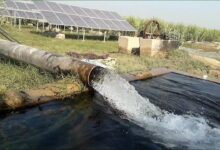City underground water aquifers level managed to stops declining the first time in history
LAHORE: For the primary time within the history of Lahore, Water and Sanitation Agency (Wasa) has managed to prevent the depletion of underground water aquifers by taking effective measures to prevent unnecessary use of groundwater.
Since 1960, underground water was depleting by one meter each year which implies underground water was happening by 3.37 feet annually. In 1960, the minimum level of underground water level was 5.7 meters and the maximum was 15.695 meters whereas in 2018 the minimum level was 23.500 meters and therefore the maximum level was 50.150 meters.
In 2019, the minimum level of underground water aquifer improved slightly because it came to 23 meters whereas the most level also improved touch and stayed at 50 meters. Similarly, in 2020 the minimum level and maximum level remained at 23 meters and 50 meters, respectively.
Wasa director Syed Zahid Aziz said water in Pakistan has declined by sixfold per capita since 1960.
“Nature has blessed Pakistan with abundant water but the extraordinary increase could be a major reason for the decline in water availability,” he claimed, adding thanks to this the ratio of per capita availability of water has declined. He said the annual call Lahore’s underground water aquifer was up to 1 meter each year except for the last three years the underground aquifer wasn’t decreasing.
The MD termed it an enormous achievement and said maintaining minimum and maximum levels of underground water aquifer means the lifetime of Lahore’s underground water aquifer has increased. “If this depletion continued then within the coming years the town may witness water scarcity,” he said, adding the steps taken by Wasa to prevent unnecessary use of underground water showed these results.
He said Wasa, under the guidance of the Punjab government, took various steps to regulate the depletion of underground water. He said as a primary step, Wasa introduced licensing system and imposition of aquifer charges, which reduced the employment of excessive water pumping being done by tube-wells privately sector.
Secondly, Wasa introduced recycling of car washing water at 310 service stations in Lahore and heavy fines were imposed on the car washing units who didn’t install water recycling plants. He said presently every car wash unit within the provincial metropolis has its own water industrial plant and Wasa teams distributed their inspections randomly.
He said another landmark step of Wasa to regulate excessive use of underground water was introduction of reuse of ablution water at 200 mosques. He said used ablution water was transferred to nearby parks for gardening purposes because of which the water pumping by Parks and Horticulture Authority (PHA) reduced significantly.
He said that fines on water wastage because of ramp washing and car washing through pipes in residential, commercial and industrial areas were also imposed and Dolphin Force was engaged to share pictures of water wastage as evidence.
Wasa has also completed the construction of 1 underground rainwater tank while two were under construction. These tanks will store rainwater which is able to be later employed by PHA for gardening purposes and fire brigade services and it’ll further reduce the utilization of tube wells.
The MD said that the timing of all tube wells within the city was rescheduled. Earlier, the tube wells were operative for 18 hours and pumping water out from the bottom while now they were operated for 8 hours on a daily basis. “This landmark achievement isn’t possible without the support of the chief minister and LDA’s body,” he said and praised the whole Wasa team and citizens who gave full support to Wasa.











Takiiii